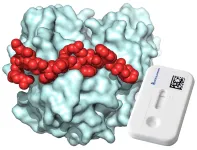(Press-News.org) Researchers from universities across the United States will arrive at the U.S. House and Senate on Wednesday for meetings with lawmakers and their staffs about the importance of fundamental science and funding for the National Institutes of Health, the National Science Foundation and the Department of Energy Office of Science.
Their advocacy is particularly crucial this year in light of the current tense negotiations over raising the debt ceiling, which threatens non defense discretionary funding, including for scientific research, public health and many other aspects of federal government funding.
The researchers participating in Hill Day are members of the American Society for Biochemistry and Molecular Biology Public Affairs Advisory Committee, chaired by Richard Page, a professor and associate vice president for research and innovation of at Miami University. Current ASBMB President Ann Stock, a professor of biochemistry and molecular biology at Rutgers University, and past ASBMB President Toni Antalis, a professor of physiology at the University of Maryland School of Medicine, will also be present. They have a number of pressing issues, such as funding for the National Institute of General Medical Sciences specifically, related to fundamental science funding to discuss with policymakers and their offices.
The 16 researchers will meet with, among others, the staffs of U.S. Sens. Bill Hagerty R-Ten., Marco Rubio R-Fla., Maria Cantwell D-Wash., Deb Fischer R-Neb., J.D. Vance R-Ohio., Chris Van Hollen D-Md., Kirsten Gillibrand D-N.Y., Robert Menendez D-N.J., Cory Booker D-N.J., Tim Kaine D-Va. and Ted Cruz R-Texas.
Meetings have also been scheduled with U.S. Reps. Dan Newhouse R-Wash., Tom Cole R-Okla., James McGovern D-Mass., Frank Pallone D-N.J., Russ Fulcher R-Idaho, Don Bacon R- Neb., Rob Wittman R-Va. and Mark Green R-Ten.
The meetings will take place on the Hill for the first time in four years. Marc Gillespie, a professor of pharmaceutical sciences at St. John’s University and ASBMB PAAC member, participated in last year’s virtual Hill Day and found the experience very rewarding and effective.
“Any opportunity to voice the needs of the scientific community to our representatives is well appreciated,” Gillespie said. “The (COVID-19) pandemic and other social factors have stressed the need for clear scientific discourse and public explanations of what science can achieve and what resources are needed to reach those goals.”
Steve Caplan, a professor of medicine at the University of Nebraska Medical Center and ASBMB PAAC member, Stock and others will be returning to the Hill after past participation to continue advocating for fundamental science funding.
“It is unique to see such passion and universal support among PAAC committee members for our mission of advancing science at all levels, and it is equally gratifying to see such strong support from our representatives on Capitol Hill,” Caplan said.
The 2023 Hill Day participants will include:
Toni Antalis, professor of physiology at the University of Maryland School of Medicine
Steven Caplan, professor of medicine at the University of Nebraska Medical Center
Katherine Friedman, associate professor of biological sciences at the Vanderbilt University
Kevin Gardner, professor of chemistry and biochemistry at City College of New York Advanced Science Research Center
Matthew Gentry, professor of biochemistry and molecular biology at the University of Florida College of Medicine
Shantá Hinton, professor of biology at the College of William & Mary
Jill Johnson, professor of biological sciences at the University of Idaho
Karen Lewis, associate professor of chemistry and biochemistry at Texas State University
Mary Lipton, staff scientist at the Pacific Northwest National Laboratory
Richard Page, professor of chemistry and biochemistry at Miami University
Emily Pitsch, graduate student at the University of Utah
Nick Rhind, professor of biochemistry and molecular biotechnology at the University of Massachusetts Chan Medical School
Ann Stock, professor of biochemistry and molecular biology at Rutgers University
Ronald Wek, professor of biochemistry at the Indiana University School of Medicine
Ann West, professor of chemistry and biochemistry at the University of Oklahoma
Jeffrey Wilusz, professor of RNA biology and virology at Colorado State University
About the American Society for Biochemistry and Molecular Biology (ASBMB) The ASBMB is a nonprofit scientific and educational organization with more than 12,000 members worldwide. Founded in 1906 to advance the science of biochemistry and molecular biology, the society publishes three peer-reviewed journals, advocates for funding of basic research and education, supports science education at all levels, and promotes the diversity of individuals entering the scientific workforce. For more information about the ASBMB, visit www.asbmb.org.
END
Researchers to advocate for fundamental science on Capitol Hill
Biochemists and molecular biologists to stress the importance of continued science funding for NIH, NSF, DOE
2023-05-17
ELSE PRESS RELEASES FROM THIS DATE:
Lesbian, bisexual women more likely to have worse heart health than heterosexual women
2023-05-17
Research Highlights:
In a study of nearly 170,000 adults in France, lesbian and bisexual women had lower cardiovascular health scores compared to heterosexual women.
In contrast, gay and bisexual men had higher ideal cardiovascular health scores compared to heterosexual men.
The study is the first to examine ideal cardiovascular health scores in sexual minorities.
Embargoed until 4 a.m. CT/5 a.m. ET Wednesday, May 17, 2023
DALLAS, May 17, 2023 — Lesbian and bisexual women were less likely to have ideal cardiovascular health scores compared to heterosexual women, which ...
Learning to save lives can start as early as age 4, according to new scientific statement
2023-05-17
Statement Highlights:
School-aged children are highly motivated to learn basic life-saving skills, such as recognizing a cardiac arrest, calling for help and performing cardiopulmonary resuscitation (CPR), according to a new scientific statement from the International Liaison Committee on Resuscitation (ILCOR), the American Heart Association and the European Resuscitation Council.
The statement identifies age-appropriate best practices to help children learn various skills that are part of the cardiac arrest chain of survival.
Teaching children about CPR at regular intervals as they age will develop their ...
Diagnosing inflammatory diseases with synthetic peptides
2023-05-17
Common inflammatory disorders such as ulcerative colitis and Crohn's disease can be diagnosed or monitored by measuring the protein calprotectin in stool samples, while serum levels of calprotectin could be used to monitor the inflammation status in rheumatoid arthritis. Calprotectin concentrations in patient samples are typically determined using antibodies that bind and detect the protein, e.g. in lateral flow assays like the now all-too-familiar home COVID-19 test kits.
But there is a problem with antibody-based calprotectin assays: the results can vary depending on the type of antibody ...
Study reveals cardiovascular health disparities based on sexual orientation
2023-05-17
In a recent nationwide study from France, lesbian and bisexual women had worse cardiovascular health scores than heterosexual women. The study, which is published in the Journal of the American Heart Association, also found that gay and bisexual men tended to have better cardiovascular health scores compared with heterosexual men; however, rural-residing sexual minority men had worse cardiovascular health compared with heterosexual men.
The study included 169,434 cardiovascular disease–free adults and assessed nicotine exposure, diet, physical activity, body mass index, sleep health, blood glucose, blood pressure, and blood lipids.
“Overcoming preventive ...
How well do interventions that include a case manager help individuals experiencing homelessness?
2023-05-17
A recent analysis of published studies examined a wide range of interventions that include a case manager to help individuals experiencing homelessness find stable housing. The analysis, which is published in Campbell Systematic Reviews, explored components most likely to lead to improvements in housing, health, and other outcomes.
In the analysis of 64 intervention studies and 41 implementation studies mainly from the United States and Canada, investigators found that any type of case management improves homelessness outcomes for people with additional support ...
How do combat-related injuries and their treatments affect bone health?
2023-05-17
Combat-related injuries to bone are common in military personnel and can lead to pain and disability. Results from a new study in the Journal of Bone and Mineral Research suggest that amputations for such injuries may negatively affect bone mass.
In the study of 575 male adult UK military personnel with combat-related traumatic injuries and 562 without such injuries, veterans who sustained traumatic amputations often had low bone density in the hip region. Changes in bone health appeared to be mechanically driven rather than systemic and were only evident ...
Changes to the diagnosis and treatment of COVID-19 in China throughout the pandemic
2023-05-17
An article in Health Care Science provides an in-depth analysis of the changes made to the diagnosis and treatment protocol for COVID-19 in China over the course of the pandemic.
The authors compare and summarize each of the 10 versions of the protocol issued by the National Health Commission of China over 3 years, highlighting the evolving scientific evidence and disease situation that informed these changes.
The summary provides valuable insights into the adaptive healthcare management and response to COVID-19 in China, which can inform the global response to the pandemic.
“Clinical ...
Does brepocitinib benefit patients with psoriatic arthritis?
2023-05-17
Brepocitinib is an oral drug that inhibits certain enzymes involved in inflammation—called tyrosine kinase 2 and Janus kinase 1—and is being tested for the treatment of several immunological diseases. A phase IIb randomized clinical trial published in Arthritis & Rheumatology recently generated promising efficacy and safety data for the use of brepocitinib in adults with moderately-to-severely active psoriatic arthritis.
Overall, 218 participants were randomized and received brepocitinib or placebo for 1 year. After 16 weeks of treatment, 30 and 60 mg daily doses of brepocitinib were superior to placebo at reducing signs and symptoms ...
Vegan mothers' breastmilk contains two important nutrients, Amsterdam UMC study finds
2023-05-17
A vegan diet does not affect maternal breastmilk concentrations of vitamin B2 and carnitine, nutrients essential for the developing infant. These are the results of an Amsterdam UMC study, presented today at the 55th Annual Meeting of the European Society for Paediatric Gastroenterology, Hepatology and Nutrition (ESPGHAN).
Research has found that lactating mothers following a vegan diet compared to mothers with an omnivorous diet showed no difference in the human milk concentrations of vitamin B2 or carnitine, despite these nutrients being found in highest concentrations in animal products.
Using ...
Fauna return rapidly in planted eelgrass meadows
2023-05-17
A study of eelgrass meadows planted by researchers from the University of Gothenburg shows that fauna return rapidly once the eelgrass has started to grow. Already after the second summer, the biodiversity in the planted meadow was almost the same as in old established eelgrass meadows.
Eelgrass meadows have declined heavily in southern Bohus county in recent decades and in many places have disappeared altogether. Researchers at the University of Gothenburg have been working on the restoration of eelgrass meadows for twelve years. ...
LAST 30 PRESS RELEASES:
Differing immune responses in infants may explain increased severity of RSV over SARS-CoV-2
The invisible hand of climate change: How extreme heat dictates who is born
Surprising culprit leads to chronic rejection of transplanted lungs, hearts
Study explains how ketogenic diets prevent seizures
New approach to qualifying nuclear reactor components rolling out this year
U.S. medical care is improving, but cost and health differ depending on disease
AI challenges lithography and provides solutions
Can AI make society less selfish?
UC Irvine researchers expose critical security vulnerability in autonomous drones
Changes in smoking status and their associations with risk of Parkinson’s, death
In football players with repeated head impacts, inflammation related to brain changes
Being an early bird, getting more physical activity linked to lower risk of ALS
The Lancet: Single daily pill shows promise as replacement for complex, multi-tablet HIV treatment regimens
Single daily pill shows promise as replacement for complex, multi-tablet HIV treatment regimens
Black Americans face increasingly higher risk of gun homicide death than White Americans
Flagging claims about cancer treatment on social media as potentially false might help reduce spreading of misinformation, per online experiment with 1,051 US adults
Yawns in healthy fetuses might indicate mild distress
Conservation agriculture, including no-dig, crop-rotation and mulching methods, reduces water runoff and soil loss and boosts crop yield by as much as 122%, in Ethiopian trial
Tropical flowers are blooming weeks later than they used to through climate change
Risk of whale entanglement in fishing gear tied to size of cool-water habitat
Climate change could fragment habitat for monarch butterflies, disrupting mass migration
Neurosurgeons are really good at removing brain tumors, and they’re about to get even better
Almost 1-in-3 American adolescents has diabetes or prediabetes, with waist-to-height ratio the strongest independent predictor of prediabetes/diabetes, reveals survey of 1,998 adolescents (10-19 years
Researchers sharpen understanding of how the body responds to energy demands from exercise
New “lock-and-key” chemistry
Benzodiazepine use declines across the U.S., led by reductions in older adults
How recycled sewage could make the moon or Mars suitable for growing crops
Don’t Panic: ‘Humanity’s Last Exam’ has begun
A robust new telecom qubit in silicon
Vertebrate paleontology has a numbers problem. Computer vision can help
[Press-News.org] Researchers to advocate for fundamental science on Capitol HillBiochemists and molecular biologists to stress the importance of continued science funding for NIH, NSF, DOE


